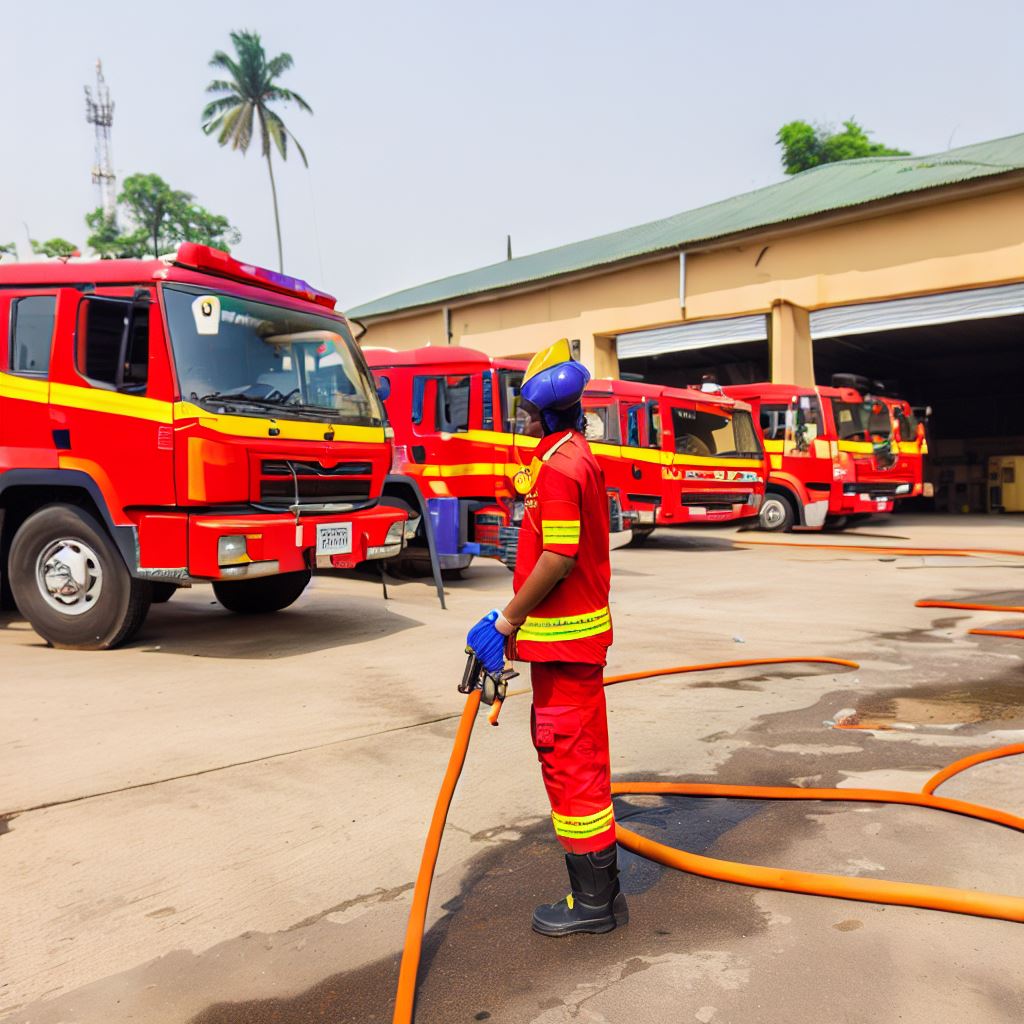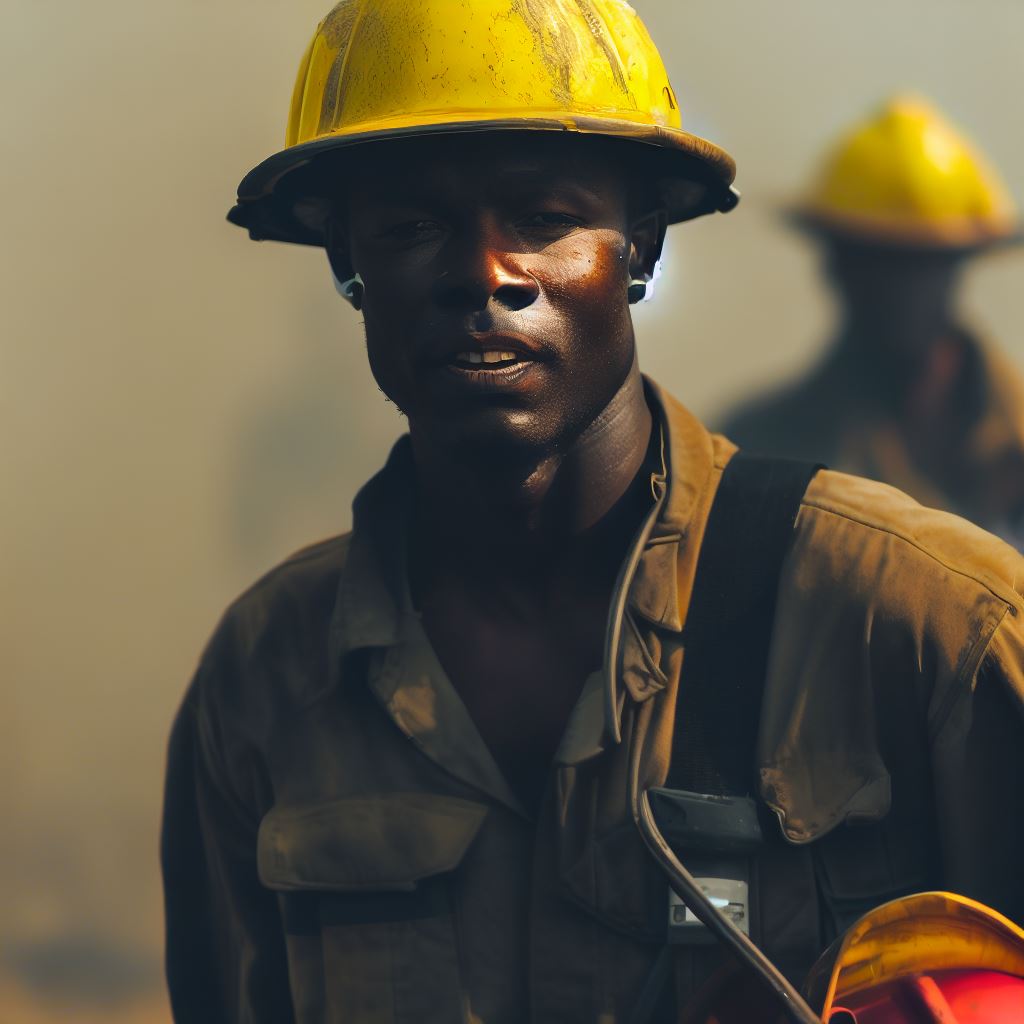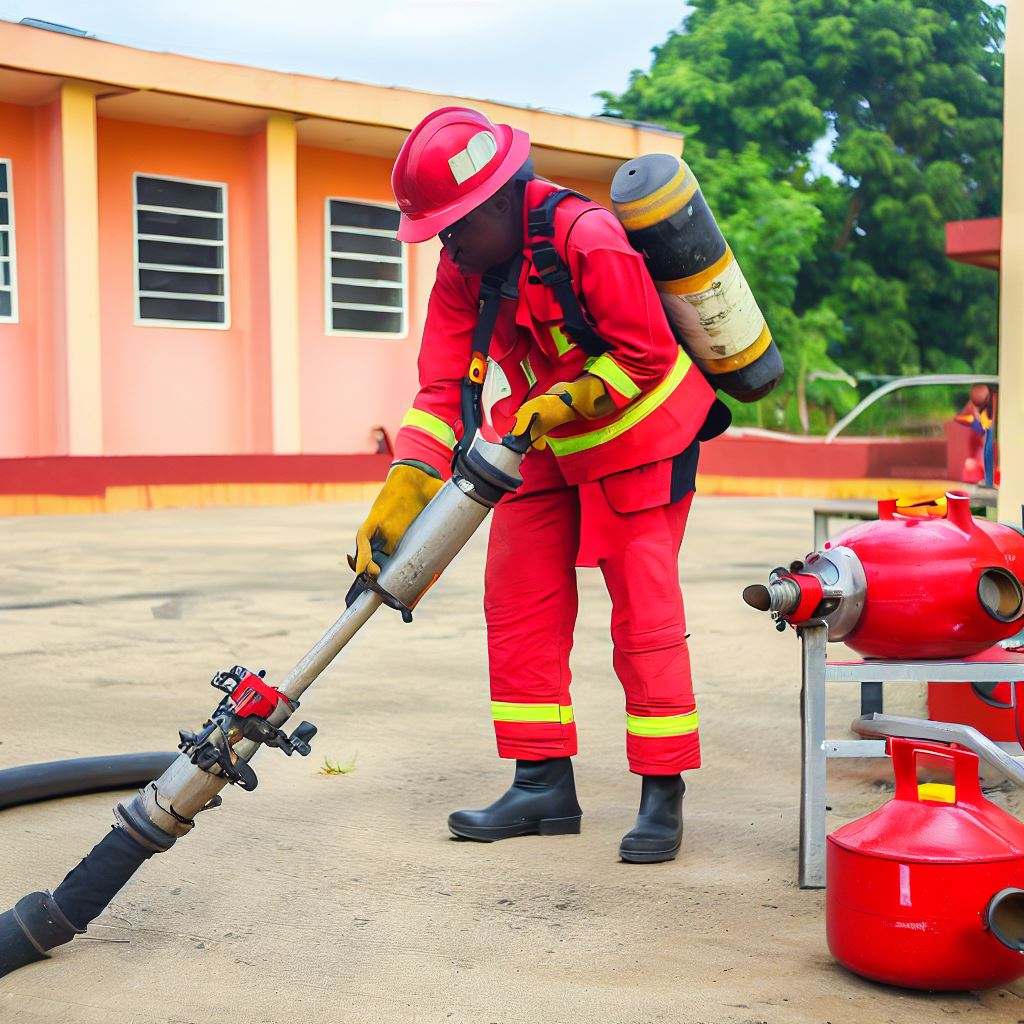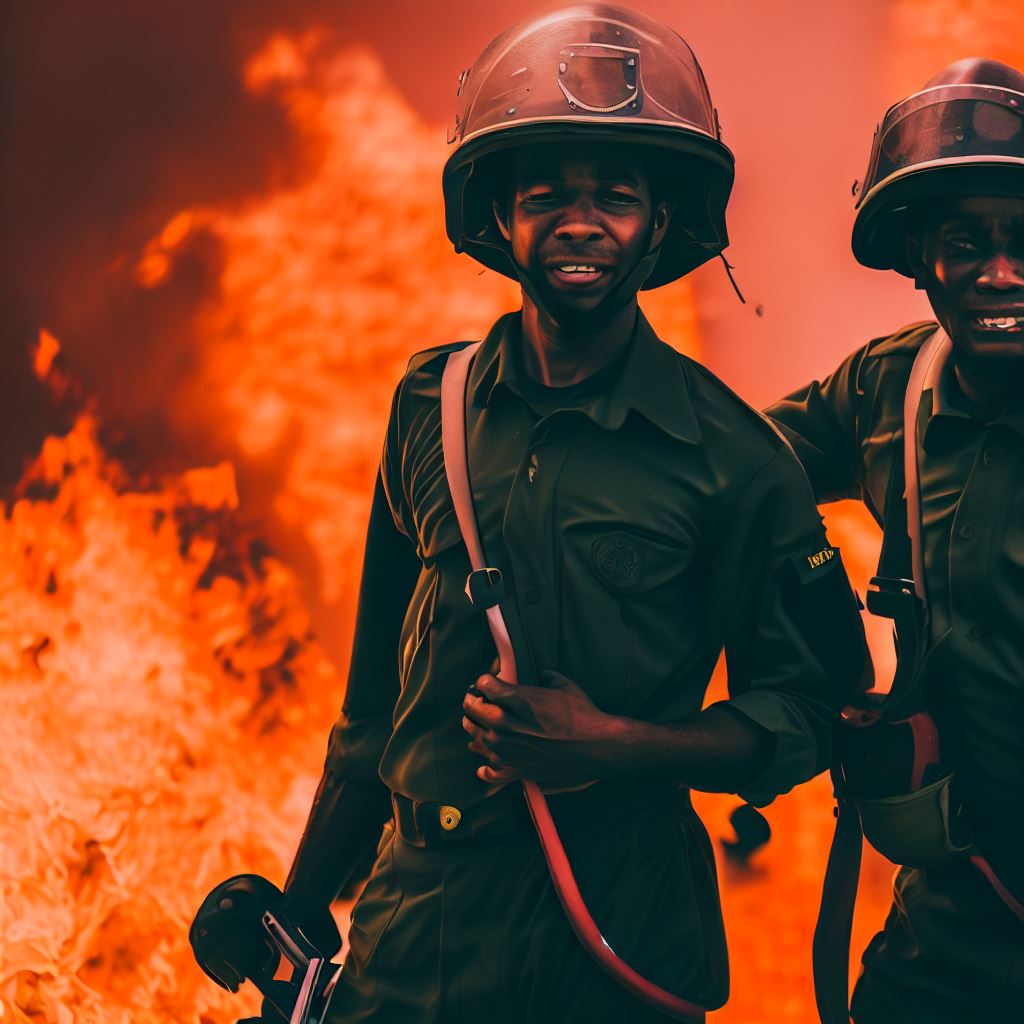Introduction
In the dynamic tapestry of Nigeria’s safety landscape, Fire Fighting Laws and Regulations stand as steadfast sentinels.
These essential guidelines are the bedrock upon which our nation’s safety is built.
Nigeria, recognizing the paramount importance of fire prevention and management, has diligently crafted and enforced a comprehensive framework of fire-related laws and regulations.
These measures serve as a protective shield, ensuring the safety of our citizens and safeguarding their property.
From stringent building codes to fire safety standards for industrial facilities, Nigeria leaves no stone unturned in its commitment to fire prevention and control.
The enforcement of these regulations is not just a legal obligation but a moral duty, as they directly impact the lives and livelihoods of our people.
In the sections ahead, we delve deeper into the intricate web of Fire Fighting Laws and Regulations in Nigeria, exploring their nuances and the pivotal role they play in our society.
Historical Background of Fire Fighting Laws in Nigeria
Early fire fighting efforts in Nigeria
- Nigeria’s history of fire fighting dates back to the pre-colonial era.
- Local communities devised rudimentary methods like using water-filled animal skins to extinguish fires.
- Efforts were communal, relying on the collective strength and resources of the community.
- Fire outbreaks were relatively contained due to the low population density at the time.
Development and implementation of fire fighting laws and regulations
- The introduction of colonial rule in Nigeria led to the establishment of formal fire fighting systems.
- In 1879, the Lagos Town Council enacted the first fire prevention regulations.
- This marked the beginning of formal legislation to address fire safety.
- The Lagos Fire Brigade was subsequently established in 1895, under the ordinance of the Lagos Province.
- Similar fire brigades were later established in other major cities across Nigeria.
- The Fire Service Act of 1963 provided a legal framework for fire safety management at the national level.
Key events that shaped fire safety practices in Nigeria
- The Kano Textile Mills fire disaster in 1956 prompted a greater emphasis on fire safety.
- It led to a series of reforms, including the establishment of fire safety committees and improved infrastructure.
- The Federal Fire Service was created in 1963 following the merger of various regional fire services.
- In 1981, the National Fire Service was formed to consolidate fire safety efforts across the country.
- Fire safety education campaigns and training programs became more widespread in the 1990s.
- The Fire Service Act of 2004 further strengthened fire safety regulations and enforcement.
- Today, fire safety is a critical aspect of building codes and regulations in Nigeria.
As Nigeria continues to grow and develop, the importance of effective fire fighting laws and regulations cannot be overemphasized.
A solid historical background has paved the way for the current fire safety practices in the country.
Early efforts by local communities laid the foundation for more organized fire fighting systems during colonial rule.
The enactment of fire prevention regulations and the establishment of dedicated fire brigades marked important milestones in fire safety management.
Key events, such as the Kano Textile Mills fire disaster, prompted further reforms and the creation of national fire services to coordinate efforts.
Today, fire safety education and training programs play a significant role in raising awareness and improving fire prevention practices.
The Fire Service Act of 2004 has also provided a comprehensive legal framework to ensure compliance and enforcement.
In fact, the historical background of fire fighting laws in Nigeria highlights the evolution and importance of fire safety practices.
From early communal efforts to modern national fire services, Nigeria has made significant progress in mitigating fire risks.
However, there is a continuous need for improvement and collaboration between authorities, communities, and individuals to ensure effective fire safety measures in the country.
The Role of Government Agencies in Fire Safety
Overview of government agencies responsible for fire safety in Nigeria
- Federal Fire Service (FFS): Main agency responsible for fire prevention and control at the federal level.
- State Fire Services: Each state has its own fire service department to handle fire-related emergencies.
- Local Government Fire Brigades: These agencies operate at the local government level to ensure fire safety.
Functions and responsibilities of these agencies
- Fire Prevention: Government agencies conduct regular inspections of buildings to ensure compliance with fire safety standards.
- Firefighting: They have trained personnel and equipment to respond to fire emergencies and extinguish fires.
- Public Awareness: These agencies educate the public on fire safety measures through campaigns and awareness programs.
- Investigation: Government agencies investigate fire incidents to determine their causes and prevent future occurrences.
Challenges faced by government agencies in enforcing fire fighting laws
- Inadequate Funding: Insufficient budget allocation limits the capacity of agencies to effectively carry out their responsibilities.
- Lack of Modern Equipment: Outdated equipment and technology hinder firefighters’ ability to combat fires efficiently.
- Limited Personnel: Insufficient staffing levels impact the response time and effectiveness of firefighting operations.
- Poor Infrastructure: Many public buildings lack adequate fire prevention systems, making them vulnerable to fires.
- Low Public Awareness: Some citizens are not fully aware of fire safety measures, leading to non-compliance with regulations.
- Corrupt Practices: Instances of bribery and corruption can undermine the enforcement of fire safety laws.
In short, government agencies play a crucial role in fire safety in Nigeria.
The Federal Fire Service, state fire services, and local government fire brigades work together to prevent fires, respond to emergencies, and raise public awareness about fire safety.
However, they face various challenges, including inadequate funding, lack of modern equipment, limited personnel, poor infrastructure, low public awareness, and corrupt practices.
Addressing these challenges is essential to enhance the effectiveness of fire safety enforcement in Nigeria.
Read: Challenges and Triumphs: Fire Fighting in Nigeria
Key Fire Fighting Laws and Regulations in Nigeria
Fire safety is a paramount concern for any society, and Nigeria is no exception.
To ensure the protection of lives and property, Nigeria has instituted a robust framework of Fire Fighting Laws and Regulations.
Understanding and adhering to these laws is imperative for individuals, businesses, and organizations.
At the core of this framework are the Nigerian Fire Prevention and Safety Regulations.
These regulations provide a comprehensive roadmap for effective fire prevention and response.
They delineate the responsibilities of individuals and entities in upholding fire safety standards.
One critical aspect is the requirement for fire safety equipment in all types of buildings. From homes to industries, fire extinguishers, alarms, and sprinkler systems are mandatory.
Regular maintenance ensures these lifesaving systems stay operational.
Additionally, the regulations mandate the creation of fire prevention plans, risk assessments, escape routes, and training.
These measures are vital for reducing the risk of fire outbreaks and ensuring swift, effective responses in emergencies.
Non-compliance carries significant penalties, fostering accountability and responsible fire safety practices. Beyond these regulations, building codes and training mandates further bolster fire safety nationwide.
In essence, Nigeria’s Fire Fighting Laws and Regulations provide a robust foundation for fire prevention and safety.
It’s our collective responsibility to be well-versed in these laws and actively contribute to creating a fire-safe Nigeria.
Read: Fire Fighter Training: A Guide to Courses in Nigeria

Challenges and Gaps in Current Fire Fighting Laws and Regulations
Lack of public awareness of fire safety regulations
- The general public in Nigeria is not well informed about existing fire safety regulations.
- This lack of awareness contributes to the increased risk of fire accidents.
- Without proper knowledge, people are not equipped to prevent fires or respond effectively in emergencies.
- An urgent need exists to educate the public on fire safety regulations and practices.
- Efforts should be made to raise awareness through campaigns, public service announcements, and educational programs.
Inadequate funding for fire fighting agencies
- Fire fighting agencies in Nigeria often face financial constraints.
- Limited funding restricts their ability to procure modern equipment and train personnel.
- This lack of resources hinders their effectiveness in responding to fire emergencies.
- The government should allocate sufficient funds to ensure proper functioning of fire fighting agencies.
- Increased investment in fire fighting equipment and training will enhance emergency response capabilities.
Inconsistencies and loopholes in existing laws
- There are inconsistencies and loopholes in the current fire fighting laws and regulations.
- These gaps weaken their effectiveness in preventing and managing fire incidents.
- The government must review and update these laws to address the identified inconsistencies and loopholes.
- Regular evaluation and amendments will ensure that the laws remain relevant and enforceable.
- Enhancing regulatory frameworks will contribute to more effective fire prevention and response measures.
Need for updated regulations to address emerging fire safety risks
- The fire safety landscape is constantly evolving with new technological advancements and emerging risks.
In general, the challenges and gaps in current fire fighting laws and regulations in Nigeria must be addressed to enhance fire safety across the country.
The lack of public awareness, inadequate funding for fire fighting agencies, inconsistencies and loopholes in existing laws, and the need for updated regulations to address emerging fire safety risks are pressing issues.
Through increased public education, sufficient funding, regular review and revision of existing laws, and proactive measures to address emerging risks, Nigeria can improve its fire safety landscape and protect lives and properties from preventable fire accidents.
Read: Nigeria’s Fire Fighting: A Day in the Life of a Hero
Impacts of Fire Fighting Laws and Regulations on Society
A well-implemented and enforced set of fire fighting laws and regulations in Nigeria can bring about several positive impacts on society.
These impacts include:
Reduction in fire-related accidents and fatalities
- Stricter regulations ensure safer fire prevention measures and emergency responses.
- Increased awareness and adherence to fire safety protocols leads to fewer accidents.
- Efficient enforcement reduces loss of life and property due to fires.
Support for economic development and investment
- Established fire fighting laws build confidence among investors and businesses.
- Reduced fire incidents protect businesses, promoting economic stability and growth.
- Laws encourage fire safety investments by companies, creating job opportunities.
Improved safety standards in public and private spaces
- Fire codes ensure buildings meet safety requirements, protecting occupants.
- Regular inspections identify hazards, fostering a culture of prevention and preparedness.
- Strong regulations enable more effective fire protection systems in all public areas.
Importance of community engagement in fire prevention efforts
- Fire laws promote community involvement through awareness campaigns and training.
- Collaboration between citizens, fire services, and authorities strengthens disaster preparedness.
- Increased community engagement leads to timely reporting of potential fire hazards.
These impacts demonstrate the invaluable role of fire fighting laws and regulations in Nigeria.
By prioritizing fire safety, society can achieve a safer environment, economic stability, and enhanced community resilience.
Read: Environmental Impact: Fire Fighting in Nigeria Today
Find Out More: Beauty Therapist Licensing in Nigeria: What You Need to Know
Recommendations for Enhancing Fire Fighting Laws in Nigeria
In order to effectively address the challenges surrounding fire safety and protection in Nigeria, it is crucial to enhance the existing fire fighting laws through various measures.
The following recommendations should be considered:
Strengthening enforcement mechanisms and penalties
- Establishment of specialized fire safety enforcement agencies with dedicated personnel and resources.
- Regular training and capacity building for fire safety enforcement officers to improve their skills and knowledge.
- Implementation of stricter penalties for non-compliance with fire safety regulations, including fines and imprisonment.
- Regular inspections and audits of high-risk buildings and public spaces to ensure compliance with fire safety standards.
- Collaboration with law enforcement agencies to enforce fire safety regulations and prosecute offenders.
Increasing public awareness through education campaigns
- Launching comprehensive public education campaigns to raise awareness about fire safety and prevention.
- Utilizing various communication channels such as mass media, social media, and community engagement programs.
- Promoting the importance of fire safety in schools, workplaces, and public institutions through training and awareness programs.
- Encouraging the inclusion of fire safety measures in the curriculum of educational institutions at all levels.
- Collaboration with non-profit organizations and community leaders to reach a wider audience and promote fire safety awareness.
Collaboration between government agencies, fire departments, and stakeholders
- Strengthening coordination and information sharing between government agencies responsible for fire safety and prevention.
- Establishment of a national fire safety council to oversee the coordination efforts and address policy gaps.
- Collaborating with fire departments and emergency response agencies to improve response time and effectiveness.
- Engaging stakeholders such as building owners, developers, architects, and engineers in the development and implementation of fire safety measures.
- Encouraging partnerships with insurance companies to incentivize fire safety compliance for insured properties.
Regular review and updates of fire fighting laws to reflect current risks and technologies
- Conducting regular assessments of fire risks and vulnerabilities to inform updates in fire fighting laws and regulations.
- Incorporating emerging technologies and innovative solutions in fire prevention, detection, and suppression systems.
- Establishing a mechanism for continuous feedback and improvement of fire fighting laws based on lessons learned from fire incidents.
- Engaging experts and industry professionals in the review process to ensure the relevance and effectiveness of fire safety measures.
- Conducting public consultations to gather input and feedback from the public and relevant stakeholders during the law review process.
By implementing these recommendations, Nigeria can significantly enhance its fire fighting laws and effectively address the growing challenges and risks associated with fire incidents.
It is crucial to prioritize the safety and well-being of citizens and ensure a robust fire safety framework in the country.
Conclusion
Recap of key points discussed in the blog post
Throughout this blog post, we have explored the various fire fighting laws and regulations in Nigeria.
We have discovered that these laws are crucial in ensuring the safety of lives and the protection of property.
Emphasis on the importance of effective fire fighting laws and regulations in saving lives and protecting property
Effective fire fighting laws and regulations are essential in preventing fire incidents and minimizing their impact.
They provide a framework for fire safety measures and promote efficient response and mitigation strategies. By following these laws, lives can be saved, and property can be safeguarded.
Call to action for individuals and organizations to prioritize fire safety in Nigeria
It is of utmost importance for both individuals and organizations to prioritize fire safety.
This can be achieved by complying with fire fighting laws and regulations, conducting regular fire drills, investing in fire prevention measures, and ensuring the availability of proper fire fighting equipment.
Together, we can create a safer Nigeria.
The implementation of effective fire fighting laws and regulations in Nigeria is a vital step towards protecting lives and property.
Let us all take responsibility and actively contribute to fire safety efforts.




